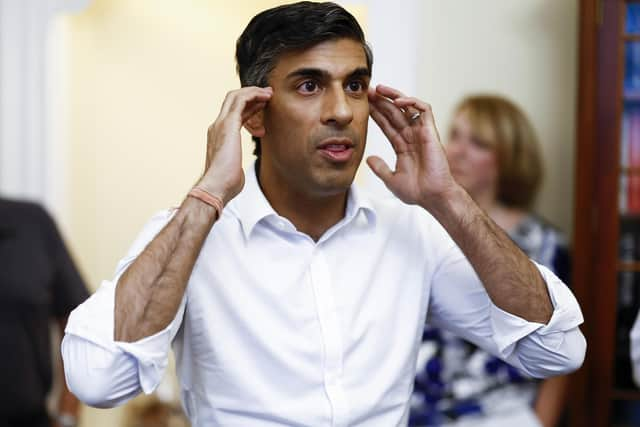Rishi Sunak will need to cut spending and raise taxes, think-tank warns
A report published on Tuesday by the Resolution Foundation suggests Mr Sunak, alongside Chancellor Jeremy Hunt, faces an “unpalatable menu” when it comes to re-balancing the nation’s finances.
After the disastrous mini-budget drive by Liz Truss and former chancellor Kwasi Kwarteng that saw the pound crash and mortgage offers rescinded, the think-tank suggests the UK Government will need to find at least £40bn in savings.
Advertisement
Hide AdAdvertisement
Hide AdThe dire warning comes with Mr Sunak working with Mr Jeremy Hunt ahead of the autumn statement on November 17.


The Resolution Foundation warns the Office for Budget Responsibility could predict a recession next year, with GDP forecasts cut by up to 4 per cent by the end of 2024.
Unemployment could also rise by around half a million, the report suggests, with the weaker economic outlook bringing borrowing up by around £20bn a year by 2026/27.
James Smith, research director at the Resolution Foundation, said: “The Government has a little over two weeks to finalise its plans to repair its economic credibility and the sustainability of the public finances.
“While the recent focus has been on conditions improving post-Trussonomics, the central picture remains one of a weaker growth, higher borrowing costs and expensive tax cuts that have left a fiscal hole of at least £40bn to fill.”
According to the report, the Government may struggle to meet its fiscal rules of reducing the debt-to-GDP ratio in the medium term and delivering a current-budget balance unless “significant further policy action is taken”.
Among the “menu” of options open to the Chancellor includes cuts to investment spending, a move the Resolution Foundation warns could save £10bn, but also have a detrimental impact on growth.
The think-tank also suggests the Government could try to choose the so-called “austerity option”, with cuts to departments already facing a squeeze.
Advertisement
Hide AdAdvertisement
Hide AdThe organisation explained: “With inflation at its highest level for 40 years, Government departments are already seeing their budgets fall in real terms by around £22bn by 2024/25.
“It is hard to see how the Treasury could credibly save more than £20bn by announcing cuts to day-to-day public service spending.”
The Resolution Foundation study suggests the new administration could save £9bn by choosing not to raise benefits and pensions in line with rising prices next year.
It warns any such move would have a “huge” impact on those struggling, with a low-income working family with two children losing around £750 and a pensioner £342.
One option open to the new Prime Minister and Chancellor would be to “go full circle” on the mini-budget by re-instating the health and social care levy – a move that would raise £15bn by 2026/27.
Around £2bn could also be raised by extending the “stealth” freezes in income tax thresholds by a further year to 2026/27.
Mr Smith explained the lesson from history is that public investment projects are likely to face cuts.
“History tells us that this will involve cuts to public investment, which are easy to announce, but reduce growth in the longer term,” he said.
Advertisement
Hide AdAdvertisement
Hide Ad“Further austerity for public services is also likely, but there are limits to how big these can credibly be, as public services are already facing cuts of £22bn thanks to high inflation.
“This reality means that the Autumn Statement is likely to involve tax rises, not just spending cuts.”
A Treasury spokesperson said: “As the Chancellor has made clear, our challenging fiscal situation means there are difficult decisions to be made and nothing is off the table in the pursuit of economic stability – but protecting public services and the most vulnerable will beprioritised.”
The spokesperson added all taxes were kept under review and any changes to tax policy would be announced by the Chancellor at the Autumn Statement.
The Chancellor will publish the Government’s fiscal rules, including how it will deliver on its commitment to get debt falling over the medium term, alongside a full forecast from the independent Office for Budget Responsibility at the Autumn Statement.
Shadow chancellor Rachel Reeves said: “The damage has been done by the Tories – not just by the economic crash caused by the mini-Budget, but by 12 years of wasted opportunities and incompetence. What Britain needs is economic stability and a real plan for growth, not another vicious cycle of stagnation under this high tax, low growth former chancellor.
“From our strong fiscal rules and Office for Value for Money, to our Green Prosperity Plan, Industrial Strategy, and our plan to scrap and replace business rates with a fairer system, Labour will bring the stability and growth Britain needs.”
Comments
Want to join the conversation? Please or to comment on this article.
